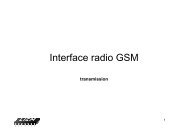Dependable Memory - Laboratoire Interface Capteurs ...
Dependable Memory - Laboratoire Interface Capteurs ...
Dependable Memory - Laboratoire Interface Capteurs ...
You also want an ePaper? Increase the reach of your titles
YUMPU automatically turns print PDFs into web optimized ePapers that Google loves.
2.4. FT PROCESSOR DESIGN TRENDS 41<br />
Backward Error Recovery (BER) Forward Error Recovery (FER)<br />
Maintenance<br />
Call<br />
Error<br />
Detection<br />
Rollback<br />
Permanent<br />
fault<br />
Fault<br />
Handling<br />
Transient -<br />
Intermittent<br />
faults<br />
No Yes<br />
Service Continuation<br />
Permanent<br />
fault<br />
Fault<br />
Handling<br />
No<br />
Maintenance<br />
Call<br />
Error<br />
Detection<br />
Compensation<br />
Yes<br />
Transient -<br />
Intermittent<br />
faults<br />
Service Continuation<br />
Figure 2.11: Basic strategies for implementing Error Recovery.<br />
Another important aspect is where to save the states of the recovery point. A shadow register file<br />
is created in the core to save the states of the sensitive elements. The backup values in the shadow<br />
copy can be used for rollback and recovery [AHHW08]. However, some other techniques, which<br />
require high reliability, store the states of internal registers off-chip. When the states are recovered<br />
the ECC are employed to avoid possible errors. In the recent era, a lot of development has been done<br />
in BER and many low cost computers employ BER. Like IBM is employing checkpoint recovery in<br />
POWER-6 micro-architecture [MSSM10].<br />
2.4 FT Processor Design Trends<br />
Recently, fault-tolerant computing has begun to draw more and more attention in a wider range of<br />
industrial and academic communities, due to increased safety and reliability demand [ZJ08]. Today,<br />
FT is the need of real time industrial application [RI08]. Mostly, high cost solutions are not acceptable<br />
for the industry, consequently the modern processors avoid hardware replication and tend to employ<br />
alternate techniques having lower power and area overheads (like information redundancy or hybrid<br />
redundancy). Information redundancy (like employing ECC) have less hardware overhead, however



